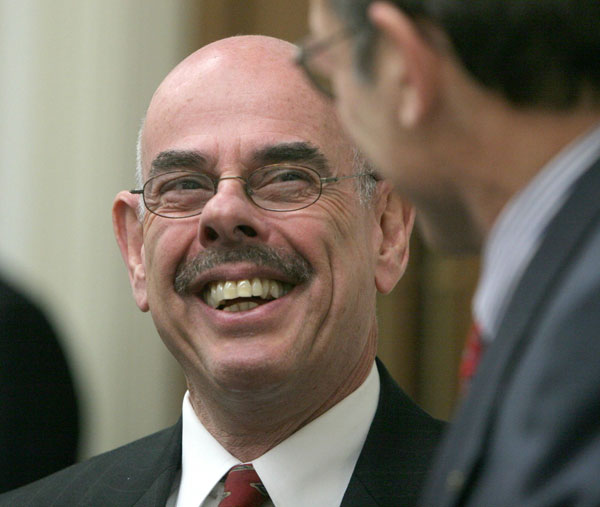Dems Defend New Mammogram Guidelines
“If we wander away from science,” Rep. Anna Eshoo (D-Calif.) said during an Energy and Commerce health subcommittee hearing to examine the guidelines, “then it will be a march to folly.”
Jul 31, 202030.3K Shares1.5M Views
Rep. Henry Waxman (D-Calif.) (WDCpix)
Contentious new mammography guidelineswere released sloppily and timed poorly, but they’re supported by the latest medical science, the drafters told lawmakers Wednesday, standing by their recommendations. And House Democrats — breaking with their Republican colleagues — overwhelmingly agreed, arguing that Congress would be foolish to allow scientific findings to be swept away in the emotional flood that followed the guidelines’ release.
“If we wander away from science,” Rep. Anna Eshoo (D-Calif.) said during an Energy and Commerce health subcommittee hearing to examine the guidelines, “then it will be a march to folly.”
[Congress1]The recommendations, crafted by the U.S. Preventive Services Task Force, stirred a political storm last month, suggesting that most women begin automatic routine mammograms at age 50, rather than 40. The task force also recommended that routine screenings occur every two years, rather than annually.
The findings have been a thorn in the side of Democrats as they aim to pass the most sweeping health-care reforms in generations, not least of all because the reform bills in both chambers lean onthe guidelines of the formerly obscure task force to guide minimum coverage standards. Many Republicans have pointed to the new mammogram recommendations as indication that the Democrats’ reforms would lead to a rationing of care.
Testifying before the House panel Wednesday, the leaders of the U.S. Preventive Services Task Force were quick to concede the gracelessness that accompanied the findings’ release. Task force Chairman Ned Calonge told lawmakers that the communication surrounding the unveiling was “poor,” and the timing “unfortunate.” The task force voted on the guidelines in the summer of 2008, he said — long before Congress had introduced health reform legislation, or the country even knew who would occupy the White House. The decision to publish last month was made by the Annals of Internal Medicine, the journal where the guidelines appeared, and was done independent of the task force. Lost in the ensuing political uproar, he said, has been what the guidelines actually say.
Diana Petitti, vice chair of the task force, said the messaging was particularly sloppy surrounding the new recommendations for those aged 40 to 49, the focus of the controversy. The lack of clarity caused many lawmakers and media outlets to misinterpret the report to mean that women in that group should neverget routine mammograms, she said. Rather, Petitti clarified, the task force suggests that women younger than 50 consult their doctors about getting mammograms rather than racing blindly to the radiologist on their 40th birthday.
“It should not be automatic, nor should it be denied,” Petitti said, conceding that the language chosen in the release “did not say what the task force meant to say.”
“The task force communication was poor,” she added.**
**
Republicans, though, were left unconvinced. Rep. Roy Blunt (R-Mo.) pointed out that an emphasis on preventive care has been a central feature of the health reform debate. By suggesting that breast cancer screenings be scaled back, he said, “the recommendations run counter to almost every other discussion we’ve been having.”
Rep. John Shimkus (R-Ill.) called the task force findings “proof” that the Democrats’ legislation would allow the government to ration care. And Rep. Phil Gingrey (R-Ga.), an obstetrician, challenged the very scientific basis of the guidelines, referring to them as the mere “opinion” of 16 members of an unelected panel. “We’re not talking about Newton’s Third Law here,” Gingrey said. (He didn’t mention that the current mammogram protocols were also recommendations of the Preventive Services Task Force.)
Most Democrats on the health subpanel had other ideas. Despite the early criticismsfrom some in the party, many leaders seem convinced that the task force acted appropriately, and their recommendations were made with the best interests of women’s health in mind. That the status quo has been challenged, many said, doesn’t mean that the new suggestions are wrong — particularly in a field as opaque as oncology.
“New information or new interpretations of old information, often result in a change in what the experts tell us works at all or works most effectively of all,” saidRep. Henry Waxman (D-Calif.), chairman of the Energy and Commerce Committee. “This is how it is supposed to be. As the science of medicine evolves, so too, should the recommendations on the best use of that science.”
Rep. Lois Capps (D-Calif.) saidthat lawmakers “owe it to our constituents and the public to listen to what a reputable group of experts in evidence-based medicine and prevention have to say.” Rep. Tammy Baldwin (D-Wis.) defended the task force members, saying they “were unequivocally doing their job.” And Rep. John Sarbanes (D-Md.) noted that the guidelines seem “to be based on very extensive studies, research and science.”
“As science advances, it causes us to revisit treatment,” Sarbanes said. “And that’s a good thing.”

Dexter Cooke
Reviewer
Dexter Cooke is an economist, marketing strategist, and orthopedic surgeon with over 20 years of experience crafting compelling narratives that resonate worldwide.
He holds a Journalism degree from Columbia University, an Economics background from Yale University, and a medical degree with a postdoctoral fellowship in orthopedic medicine from the Medical University of South Carolina.
Dexter’s insights into media, economics, and marketing shine through his prolific contributions to respected publications and advisory roles for influential organizations.
As an orthopedic surgeon specializing in minimally invasive knee replacement surgery and laparoscopic procedures, Dexter prioritizes patient care above all.
Outside his professional pursuits, Dexter enjoys collecting vintage watches, studying ancient civilizations, learning about astronomy, and participating in charity runs.
Latest Articles
Popular Articles
